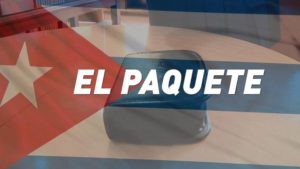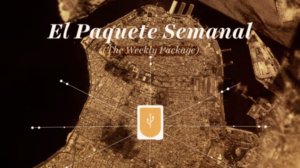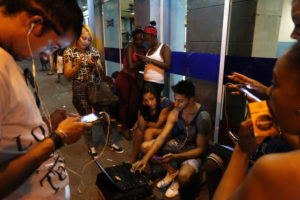Crowding outside the regal Hotel Presidente, hundreds of Cuban teenagers fight to siphon off the hotel’s pricey Wi-Fi. All of them seem to be aware that they only have an hour of internet before having to pay even more money for the costly service.
With such a limited amount of internet, the teenagers outside Hotel Presidente rush to consume as much international news and information as possible. They quickly scroll through their Facebook feeds, updating statuses and messaging friends. They check their emails and struggle to download any attachments. As the seconds count down, the Cubans grow closer and closer to losing their only tangible link to the outside world.
The images of cell phone screens lighting up dozens of Cuban faces at night seems to contradict with the ‘frozen in time’ image that so many associate with the island. While the old cars and crumbling buildings still line the streets of Old Havana, the cellphones seem oddly out of place; however, in many ways they’re just as trapped in the past as the rest of the infrastructure on this isolated island.
Costing 2 CUC per hour (approximately $2 USD), a single hour of Wi-Fi is about a tenth the value of the average Cuban salary. The service is pricey, slow, unreliable, and censored. In a single hour, it’s almost impossible to stream a video or download any documents.
In the last decade, the Cuban press has made strides to meet the growing information demands of the public, increasing public hotspots and promoting healthy dissent in government publications; however, the overall systemic change has been slow. The information is still almost completely controlled by the government and, for those who do find internet connection, the content is censored. Luckily, a few individuals have been forcing an information revolution on the island.
From government employees in censored newspaper chains, to rebellious internet bloggers, Cuba is in the midst of an information revolution. People are sharing ideas and content through both legal methods, such as the internet, and black market services in order to reshape Cuban society.
Recently, articles tastefully acknowledge minor flaws in the Cuban system and present possible government solutions; however, the change has been slow. It is still common to see articles attacking the “northern imperial oppressor” the United States, praising Venezuela, Russia, and China, or criticizing European politics.
Gay and Communist.
One journalist, Francisco Rodríguez Cruz, also known as “Paquito,” has been instrumental in changing this system from within. Paquito has been praised for his revolutionary work for the state-run Trabajadores and other online publications. “Paquito is the representative of the LGBT rights community” says dissident blogger Harold Cardenas, “Paquito has this incredible mix that is beyond compare because Paquito is gay. Paquito is Communist. Paquito is critical–he’s a critical communist–and Paquito works for the government.”

I am Paquito, the one from CUBA; Martiano and journalist; Communist and gay; Occasional convinced and superstitious atheist; Father of a boy son whom I adore and couple for ten years of a seronegative man who loves me; AIDS patient since 2003 and a non-Hodgkin lymphoma survivor for more than eight years; University professor and student of life; A follower of Cuban economic issues and a passionate devourer of universal literature; Opinionated incontinent and belligerent measured; Friend of my friends and compassionate with my enemies; Wrong many times and never repent ..
According to Cardenas, Paquito has even gone as far as impacting international politics. In 2010, while debating a bill that denounced killings inspired by sexual orientation, the Cuban government voted to remove the term sexual orientation. In response, Paquito published a harsh criticism of the government’s decision, prompting a meeting with the foreign first minister of Cuba and eventually causing the nation to reverse its decision.
While writers such as Paquito have inspired international change and altered official Cuban policy, the Cuban public has remained largely unaffected by these alterations. The continued need for information has sparked a new age of innovation in Cuba and led to some fascinating creations.
One of the more common ways that Cubans have circumvented government regulations is through the creation of independent blogs. Cardenas, a close friend of Paquito, is one of the leading bloggers on the island. His blog, ‘El Toque’, started out as a university project; however, now, Cardenas is the third most read blogger on the island.
Although his blog certainly challenges the conventional Cuban press, he doesn’t see his work as counterrevolutionary or overtly opposed to the government.
“I like to think that I have a good relationship with the government” says Cardenas. “I call myself a revolutionary, since I’m trying to change many things”. Cardenas’ blog frequently touches on sensitive issues, pushing the government and their media freedom laws. While he has been at odds with the government on multiple occasions, he sees his work as a constructive way to change the government. “What we don’t want is to be part of two sides that are blinded to each other.” By promoting dialogue and forcing the government and the Cuban people to acknowledge flaws in the system, El Toque has succeeded as an innovative new source of information.
Cardenas’ work has challenged the Cuban government and national media restrictions, but it is only one innovative form of media sharing. University of Havana professor Mabel Machado argues that the way Cubans consume information is experiencing a radical evolution. Due to limited internet access, in the last 10 years innovative Cubans have been created sophisticated offline systems to facilitate the sharing of information and communication between households.
In a way, some Cubans have created their own separate internet grid. With inventions such as Straight Network, Cubans have utilized gaming systems to connect households and neighbors, creating a larger web for mass communication. Although Machado suggests that the majority of the communications over these networks focus on sharing music and films, it provides the possibility for news circulations and the creation of an independent press.
Among all the radical innovations engineered by the Cuban public, ‘El Paquete Semanal’ (The Weekly Package) seems to be the most radical–and successful. El Paquete is a weekly media service that most Cubans note is “similar to Netflix”. El Paquete provides content to thousands of Cubans, giving them access to hundreds of popular new songs, television programs, and movies from all over the world. In addition to the entertainment content included in the flash drives, news organizations such as the Miami-based OnCuba Magazine have been able to be widely dispersed among the Cuban public despite tough national restrictions banning independent media.
This information sharing service is one of the most prevalent services, and employers, across the Cuban island; but it is illegal. Functioning entirely through Cuba’s thriving black market, El Paquete seems to be the dependable link to the outside world for most Cubans demand.
Regardless of the impressive levels of fame achieved by bloggers such as Cardenas, in Cuba, it oftentimes seems as though the only effective way to fight restrictive press laws is through El Paquete. For Cardenas, internet blogging has helped him to gain significant exposure; however, the scarce internet availability has caused him to rely on word-of-mouth. The next step for his blog, he argues, is El Paquete.
“My ambition is to put my work in El Paquete,” he says. “To have a system of information that is national is a goal for me… We want to do it and we want to do it soon”.
Agencies/Pulitzer Center/William Neely/Excerpts/ Internet Photos/ Arnoldo Varona/ TheCubanHistory.com
THE CUBAN HISTORY, HOLLYWOOD.
FOLLOW US ON TWITTER AND FACEBOOK. THECUBANHISTORY.COM

(OPINIÓN) CUBA, DESPACIO PERO CONSTANTE, FORZANDO UNA REVOLUCIÓN INFORMATIVA.
En las afueras del majestuoso Hotel Presidente, cientos de adolescentes cubanos luchan para atrapar en sus equipos la costosa conexión Wi-Fi del hotel. Todos ellos parecen ser conscientes de que sólo tienen una hora de internet antes de tener que pagar aún más dinero para el costoso servicio.
Con una cantidad limitada de Internet, los adolescentes fuera del Hotel Presidente se apresuran a consumir tanta información internacional como sea posible. Rápidamente se desplazan a través de sus feeds de Facebook, la actualización de los estados y amigos de mensajería. Revisan sus correos electrónicos y luchan por descargar los archivos adjuntos. A medida que los segundos regresan, los cubanos se acercan cada vez más a perder su único vínculo tangible con el mundo exterior.
Las imágenes de las pantallas de teléfonos celulares que iluminan a docenas de caras cubanas en la noche parecen contradecir con la imagen “congelada en el tiempo” que tantos asocian con la isla. Mientras los coches viejos y los edificios desmoronados siguen alineando las calles de La Habana Vieja, los celulares parecen extrañamente fuera de lugar; Sin embargo, de muchas maneras están tan atrapados en el pasado como el resto de la infraestructura en esta isla aislada.
Costando 2 CUC por hora (aproximadamente $ 2 USD), una hora de Wi-Fi es aproximadamente una décima parte del valor del salario promedio cubano. El servicio es caro, lento, poco fiable y censurado. En una sola hora, es casi imposible transmitir un video o descargar cualquier documento.
En la última década, la prensa cubana ha avanzado algo para satisfacer las crecientes demandas de información del público, incrementando los puntos de acceso público y promoviendo el disentimiento saludable en las publicaciones gubernamentales; Sin embargo, el cambio general sistémico ha sido lento. La información es todavía casi completamente controlada por el gobierno y, para aquellos que encuentran conexión a Internet, el contenido es censurado. Afortunadamente, algunos individuos han estado forzando una revolución de información en la isla.
Desde los empleados del gobierno en cadenas censuradas de periódicos, hasta los bloggers rebeldes de Internet, Cuba está en medio de una revolución de la información. La gente está compartiendo ideas y contenido a través de métodos legales, como Internet, y servicios del mercado negro para reformar la sociedad cubana.
Recientemente, los artículos reconocen con buen gusto los pequeños defectos del sistema cubano y presentan posibles soluciones gubernamentales; Sin embargo, el cambio ha sido lento. Todavía es común ver artículos que atacan al “opresor imperial norteño” de Estados Unidos, alabando a Venezuela, Rusia y China, o criticando la política europea.
Gay y comunista.
Un periodista, Francisco Rodríguez Cruz, también conocido como “Paquito”, ha sido instrumental en cambiar este sistema desde dentro. Paquito ha sido elogiado por su trabajo revolucionario para los Trabajadores estatales y otras publicaciones en línea. “Paquito es el representante de la comunidad de los derechos LGBT” dice el blogger disidente Harold Cardenas, “Paquito tiene esta mezcla increíble que es incomparable porque Paquito es gay. Paquito es comunista. Paquito es crítico -es un comunista crítico- y Paquito trabaja para el gobierno “.

Soy Paquito, el de CUBA; martiano y periodista; comunista y gay; ateo convencido y supersticioso ocasional; padre de un hijo varón a quien adoro y pareja desde hace diez años de un hombre seronegativo que me ama; paciente de SIDA desde el 2003 y sobreviviente por más de ocho años a un linfoma no Hodgkin; profesor universitario y alumno de la vida; seguidor de los temas económicos cubanos y apasionado devorador de literatura universal; opinático incontinente y beligerante mesurado; amigo de mis amigos y compasivo con mis enemigos; equivocado muchas veces y arrepentido nunca..
Según Cárdenas, Paquito ha llegado incluso a impactar la política internacional. En 2010, mientras debatía un proyecto de ley que denunciaba asesinatos inspirados en la orientación sexual, el gobierno cubano votó por eliminar el término orientación sexual. En respuesta, Paquito publicó una dura crítica a la decisión del gobierno, lo que provocó una reunión con el primer ministro extranjero de Cuba y eventualmente hizo que la nación revirtiera su decisión.
Mientras escritores como Paquito han inspirado el cambio internacional y alterado la política oficial cubana, el público cubano ha permanecido en gran parte no afectado por estas alteraciones. La continua necesidad de información ha provocado una nueva era de innovación en Cuba y ha llevado a algunas creaciones fascinantes.
Una de las maneras más comunes en que los cubanos han eludido las regulaciones gubernamentales es a través de la creación de blogs independientes. Cardenas, un amigo cercano de Paquito, es uno de los principales bloggers de la isla. Su blog, ‘El Toque’, comenzó como un proyecto universitario; Sin embargo, ahora, Cárdenas es el tercer blogger más leído de la isla.
Aunque su blog desafía ciertamente a la prensa cubana convencional, no ve su trabajo como contrarrevolucionario o abiertamente opuesto al gobierno.
“Me gusta pensar que tengo una buena relación con el gobierno”, dice Cárdenas. “Me llamo un revolucionario, ya que estoy tratando de cambiar muchas cosas”. El blog de Cárdenas frecuentemente aborda cuestiones delicadas, empujando al gobierno ya sus leyes de libertad de medios. Aunque ha estado en desacuerdo con el gobierno en múltiples ocasiones, ve su trabajo como una manera constructiva de cambiar el gobierno. “Lo que no queremos es ser parte de dos bandos que están cegados el uno al otro”. Al promover el diálogo y forzar al gobierno y al pueblo cubano a reconocer fallas en el sistema, El Toque ha tenido éxito como una nueva fuente innovadora de información.
El trabajo de Cárdenas ha desafiado al gobierno cubano ya las restricciones de los medios nacionales, pero es sólo una forma innovadora de compartir los medios de comunicación. La profesora de la Universidad de La Habana, Mabel Machado, argumenta que la forma en que los cubanos consumen información está experimentando una evolución radical. Debido al limitado acceso a Internet, en los últimos 10 años se han creado innovadores cubanos sofisticados sistemas sin conexión para facilitar el intercambio de información y comunicación entre hogares.
En cierto modo, algunos cubanos han creado su propia red de Internet separada. Con invenciones como Red Directa, los cubanos han utilizado sistemas de juegos para conectar hogares y vecinos, creando una red más grande para la comunicación masiva. Aunque Machado sugiere que la mayoría de las comunicaciones sobre estas redes se centran en compartir música y películas, ofrece la posibilidad de circulaciones de noticias y la creación de una prensa independiente.
Entre todas las innovaciones radicales diseñadas por el público cubano, “El Paquete Semanal” parece ser el más radical y exitoso. El Paquete es un servicio de medios semanal que la mayoría de los cubanos señalan es “similar a Netflix”. El Paquete ofrece contenido a miles de cubanos, dándoles acceso a cientos de canciones populares, programas de televisión y películas de todo el mundo. Además del contenido de entretenimiento incluido en las unidades flash, organizaciones de noticias como la Revista OnCuba, con sede en Miami, han podido estar muy dispersas entre el público cubano a pesar de las duras restricciones nacionales que prohíben a los medios independientes.
Este servicio de intercambio de información es uno de los servicios más frecuentes, y los empleadores, a través de la isla cubana; Pero es ilegal. Funcionando completamente a través del próspero mercado negro de Cuba, El Paquete parece ser el vínculo fiable con el mundo exterior para la mayoría de la demanda de los cubanos.
Independientemente de los impresionantes niveles de fama alcanzados por los bloggers como Cárdenas, en Cuba, a menudo parece como si la única manera efectiva de luchar contra las leyes restrictivas de prensa es a través de El Paquete. Para Cárdenas, los blogs en Internet le han ayudado a obtener una exposición significativa; Sin embargo, la escasa disponibilidad de Internet le ha hecho confiar en el boca a boca. El siguiente paso para su blog, argumenta, es El Paquete.
“Mi ambición es poner mi trabajo en El Paquete”, dice. “Tener un sistema de información nacional es una meta para mí … Queremos hacerlo y queremos hacerlo pronto”.
Agencias / Centro Pulitzer / William Neely / Internet Photos/ Extractos/ Arnoldo Varona / TheCubanHistory.com
THE CUBAN HISTORY, HOLLYWOOD.







